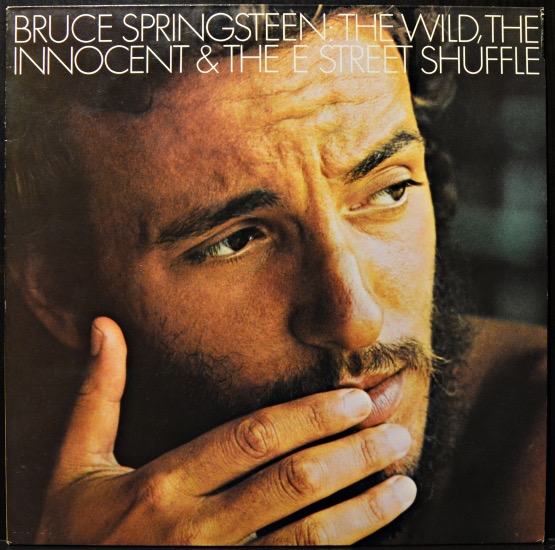
#WILD THE INNOCENT AND THE E STREET SHUFFLE SOFTWARE#
(eds.) Educational Social Software for Context-Aware Learning: Collaborative Methods & Human Interaction, pp. Pata, K.: Revising the framework of knowledge ecologies: How activity patterns define learning spaces? In: Lambropoulos, N., Romero, M. O’Malley, C., et al.: Guidelines for learning/teaching/tutoring in a mobile environment. O’Donnell, A.M., King, A.: Cognitive perspectives on peer learning. The Quality Assurance Agency for Higher education. Nicol, D.: The foundation for graduate attributes: Developing self-regulation through self and peer assessment. Morrison, G.R.: Designing Effective Instruction, 6th edn.

Meyer Resource Group, Incorporated (2003) Attitude Is Everything: If You Want to Succeed Above and Beyond. Meyer, J.: What would you do if you knew you couldn’t fail? Creating S.M.A.R.T. Merrill, M.D., Drake, L., Lacy, M.J., Pratt, J.: ID2_Research_Group: Reclaiming instructional design. (eds.) Handbook of Technological Pedagogical Content Knowledge for Educators, pp. In: Colbert, J.A., Boyd, K.E., Clark, K.A., Guan, S., Harris, J.B., Kelly, M.A., Thompson, A.D. Koehler, M.J., Mishra, P.: Introducing TPCK. Kirkwood, A., Price, L.: Enhancing learning and teaching through technology: a guide to evidence-based practice for academic developers (2011) Joseph, B., et al.: Six ways to look at badging systems designed for learning (2012),

Higher Education Funding Council for England (HEFCE) (2009), JISC: Effective Practice in a Digital Age: A guide to technology-enhanced learning and teaching. and our resources to help engage students through social media (2012), JISC: Briefing Paper 1: MLEs and VLEs Explained (2007), Instructional Design Central: What is Instructional Design (2012), Technology and Teacher Educational Annual (1998) Hoffman, B., Ritchie, D.C.: Teaching and learning online: Tools, templates, and training. HEFCE (Higher Education Funding Council for England): Enhancing Learning and Teaching Through the Use of Technology: A revised approach to HEFCE’s strategy for e-learning (2009) In: Proceedings of the 10th IEEE International Conference on Advanced Learning Technologies, pp. Gulz, A., Silvervarg Flycht-Eriksson, A., Sjödén, B.: Design for off-task interaction – rethinking pedagogy in technology enhanced learning. In: Perspectives on Activity Theory: Learning in Doing: Social, Cognitive & Computational Perspectives, pp. ASTD Learning Circuits (2009)Įngeström, Y.: Activity Theory and Individual and Social Transformation. ACM (2011)Įllis, R.K.: Field Guide to Learning Management Systems. In: Proceedings of LAK11: 1st International Conference on Learning Analytics and Knowledge, pp. Pragmatics & Cognition 16(2), 215–223 (2008)ĭuval, E.: Attention Please! Learning Analytics for Visualization and Recommendation. Springer, Heidelberg (2006)ĭror, I.E.: Technology enhanced learning: The good, the bad, and the ugly. Innovate 4(5) (2008)ĭevedzic, V.: Semantic Web and Education.

Educational Evaluation and Policy Analysis 12(3), 311–344 (1997)Ĭormier, D.: Rhizomatic education: Community as curriculum. Learning and Skills Network (2008)Ĭohen, D.: revolution in one classroom: The case of Mrs. Addison-Wesley (2006)Ĭoffield, F.: Just suppose teaching and learning became the first priority. The Caledonian Academy, Glasgow Caledonian University, Glasgow (2009)Ĭockburn, A.: Agile software development: The cooperative game, 2nd edn. Alexander, B., et al.: The peeragogy handbook (2013)Īttwell, G.: Personal Learning Environments – the future of eLearning? eLearning Papers 2(1), 1–7 (2007)Īttwell, G., Hughes, J.: Pedagogic Approaches to Using Technology for Learning: Literature Review (2010)īandura, A.: Social Learning Theory (1977)īarra, P., Usman, S.: Technology enhanced learning and assessment (2013), īeetham, H., McGill, L., Littlejohn, A.: Thriving in the 21st century: Learning Literacies for the Digital Age (LLiDA project).


 0 kommentar(er)
0 kommentar(er)
